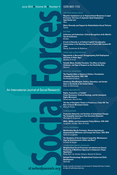-
Views
-
Cite
Cite
Maria Kousis, Protesting Culture and Economics in Western Europe: New Cleavages in Left and Right Politics By Swen Hutter University of Minnesota Press. 2014. 220 pp. $25 paper, $75 cloth, Social Forces, Volume 94, Issue 4, June 2016, Page e118, https://doi.org/10.1093/sf/sov001
Close - Share Icon Share
Extract
This refined and empirically grounded study ultimately aims to inspire scholars to address challenging economic, political, and cultural issues in the era of globalization by focusing on new and old cleavages and their manifestations in protest and electoral politics. Its findings will be of interest to political scientists, sociologists, contemporary historians, and social scientists interested in how these issues are expressed in protest and electoral arenas, from the macro to the micro perspective.
The author transcends previous related research by providing strong empirical support for a dynamic theoretical perspective on contemporary political and economic contention. Through a political process approach, following Kriesi et al. (2008), he claims that economic, cultural, and political globalization has created new groups of winners and losers, and has undermined the central power of states since the late 1980s. This, Hutter posits, has led to three types of political parties in Western Europe: the left, the moderate right, and the populist radical right. It is the populist radical right that appears to have succeeded in mobilizing the cultural fears (e.g., immigration) of the losers of globalization, and is most influential in the electoral arena. For the author, political potentials are consequently structured and mobilized by these actors within political opportunity structures, leading to particular electoral and protest interacting arenas.



